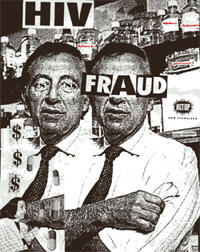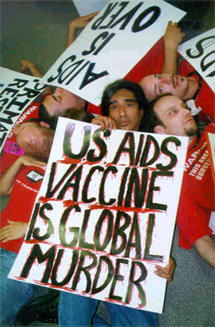 |


|
|
to AIDS Denialists |
|
By John S. James AIDS Treatment News, Publisher
This movement has learned to appeal to very different agendas; and along with heavy doses of misinformation it weaves some accurate facts and emotional, social, and political truths. It has hidden funding, celebrity endorsements, and corporate journalists who can get its views publicized in mass media as news. It does not conduct medical research nor take care of patients, but has more than a decade of experience in learning how to debate and look credible. Our concern is not the ideas--we agree that all sorts of ideas should be explored and debated--but rather the direct translation of casual speculation and debating points into the medical care of patients with life-threatening illness, which is strongly encouraged by many of the "dissidents." In the U.S., where AIDS treatments usually have been accessible to patients who need them, this movement has made noise for many years, but has found only a tiny constituency of believers who will put their lives at risk by rejecting all medical advice in favor of the rhetoric and debate. But recently it has been revitalized by tapping into other agendas in developing countries, where people have been told that they are going to die and have no chance of treatment, because the drugs have been priced far beyond their reach (by U.S. and international government policies to protect the interests of major corporations, as well as by corporate greed). The "dissidents" (we believe a better term is "AIDS denialists") have found a new audience among leaders and publics who are understandingly suspicious of a Western-dominated, heavily corporate mainstream which pursues its own profit above all else, and offers millions of people around the world nothing but death. These issues will be prominent in the next few weeks, through the XIII International AIDS Conference in Durban, South Africa, July 9-14, 2000. This conference, by far the largest in the world, happens only once every two years; this is the first meeting in a developing country. And South Africa is the only country in the world where the AIDS denialists have ever been recognized by a head of state (see "South Africa 'AIDS Dissident' Dispute: Time to Stop and Think," AIDS Treatment News #340, April 7, 2000). How to Answer
Their doctors would not discuss it, nor would any researchers they asked. Most people do not have the background or training to judge a technical scientific argument themselves; instead, they look at how they are being treated. When one side will not give them the time of day on the issue while the other is always available, they may believe those they can talk to, without hearing any other view. While some researchers and activists have answered the denialists (for Web links, see www.niaid.nih.gov/spotlight/hiv00/default.htm), it has long been difficult for patients to find understandable and effective written answers to some of their claims. So if one does answer the denialists' arguments, what form should the answers take? We have discussed this with a number of activists, and there is clearly an emerging consensus: (1) The denialist position consists of about 5 to 10 major points (depending on how you count them--we list 7 below), which are repeated again and again. Each must be addressed separately, with separate flyers or brochures which healthcare and service professionals can give to clients to address their individual concerns. (2) The back-and-forth debate format is not especially useful here, because it tends to turn on technical points, asking readers to make their own decisions on the scientific merits of the issue, which most people are not prepared to do. A better format is to explain what the denialists are saying, then show with two or three examples that their arguments are not credible--that the assertions on which they ask others to base life-and-death decisions usually leave out far more compelling information than they include. Most importantly, we need to explain what is really going on in treatment and research--the human story as well as the medical/scientific one, a reality more interesting than the stick-figure ideologies of the denialists. Here we should avoid the argumentative style of trying to score points against the other side. Instead, follow the truth wherever it may lead; when there is truth in the denialist case, by all means acknowledge it. (3) Eventually we will need an in-depth, well-referenced document explaining the issues to healthcare and AIDS service professionals, and also to patients and anyone else who wants this detailed information. (For an example of what part of this document might look like, see the article by Bruce Mirken which we published in our last issue, "Answering the AIDS Denialists: CD4 (T-Cell) Counts, and Viral Load," AIDS TREATMENT NEWS #341, April 21, 2000. This article addresses one of the seven or so major denialist assertions, which we list below. The other six articles still need to be written.) (4) From this in-depth document can come the flyers, brochures, videos, Web sites, and other media. Seven Deadly Deceptions
* HIV is harmless (or does not exist), and AIDS is not contagious--so sexual and other precautions are unnecessary. * The HIV test is unreliable--so don't get tested. * AIDS drugs are poisons, pushed by doctors corrupted by the pharmaceutical industry--so don't take any of them, no matter what your doctor says--or don't go to a doctor at all, especially if you feel well. * Viral load and CD4 tests are useless--so don't use them. * AIDS deaths would have gone down anyway, even without new treatments--so you don't need medical care. * AIDS is over, or never existed, or only affected small risk groups--so there is no important need for medical research on AIDS or HIV, or for AIDS services. * The free speech of dissenters has been suppressed--so you can't believe anything you hear. Note: We omitted the idea that AIDS was created in a government laboratory to kill African Americans, gay people, or others. This conspiracy theory is widespread in some communities, but usually does not urge people to reject medical care, or safer sex or other precautions against infection. Note on "Denialists" vs. "Dissidents" Some of these medical ideologists are upset with the term "AIDS denialists"; they prefer "AIDS dissidents," which suggests parallels with such historic examples as anti- totalitarian dissidents, or Galileo. We use "denialists" because it is more specific and descriptive. There can be many kinds of AIDS dissent. But the denialists regularly deny that precautions against infection are necessary, deny that HIV testing is appropriate, deny that any approved treatments should be used (or CD4 or viral load tests to monitor disease progression), deny that treatment saves lives, and often deny that AIDS is a real epidemic, or even a real medical condition. The problem is not ideas, but the organized efforts to practice bizarre medicine, telling people with a major illness to reject care entirely. Denialists have convinced pregnant women or mothers of HIV-positive children to reject treatment universally recommended by their doctors--then harvested publicity from court cases which result. In the U.S. and other countries where treatment is available, they have found few who will sacrifice their own lives; but now they are going to South Africa and elsewhere in the developing world, seeking to deny medical care to people who will have little or no voice in the decision, while also impeding public-health campaigns to slow the spread of HIV infection. The issue here is not freedom to express ideas; no one is stopping that. The issue is destructiveness by a handful of professional or semi-professional denialists whose ideas and behavior have failed to win them the respect they want. The AIDS denialist movement will be remembered if it can do serious damage to worldwide efforts to control the pandemic. Otherwise it will be largely forgotten, like similar movements during other epidemics in the past. AIDS Treatment News Published twice monthly Subscription and Editorial Office: P.O. Box 411256 San Francisco, CA 94141 800/TREAT-1-2 toll-free U.S. and Canada 415/255-0588 regular office number Fax: 415/255-4659 E-mail: aidsnews@aidsnews.org
Editor and Publisher: John S. James Associate Editor: Tadd T. Tobias Reader Services: Tom Fontaine and Denny Smith Operations Manager: Danalan Richard Copeland Statement of Purpose: AIDS Treatment News reports on experimental and standard treatments, especially those available now. We interview physicians, scientists, other health professionals, and persons with AIDS or HIV; we also collect information from meetings and conferences, medical journals, and computer databases. Long-term survivors have usually tried many different treatments, and found combinations which work for them. AIDS Treatment News does not recommend particular therapies, but seeks to increase the options available. Subscription Information: Call 800/TREAT-1-2 Businesses, Institutions, Professionals: $270/year. Includes early delivery of an extra copy by email. Nonprofit organizations: $135/year. Includes early delivery of an extra copy by email. Individuals: $120/year, or $70 for six months. Special discount for persons with financial difficulties: $54/year, or $30 for six months. If you cannot afford a subscription, please write or call. Outside North, Central, or South America, add air mail postage: $20/year, $10 for six months. Back issues available. Fax subscriptions, bulk rates, and multiple subscriptions are available; contact our office for details. Please send U.S. funds: personal check or bank draft, international postal money order, or travelers checks. ISSN # 1052-4207 Copyright 2000 by John S. James. |

© 1997-2000 BEI
 A poster from AIDS denialists of ACT UP/San Francisco
A poster from AIDS denialists of ACT UP/San Francisco  AIDS denialists from ACT UP/San Francisco
AIDS denialists from ACT UP/San Francisco